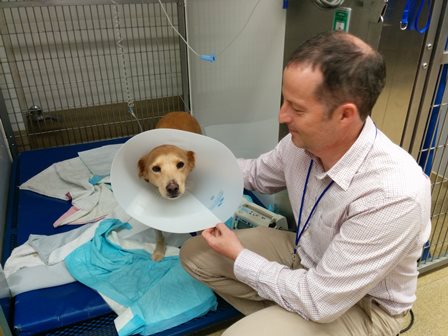Dog survives heat stroke after hemodialysis treatment at UF

Dr. Carsten Bandt tends to Marni Schwartz in the intensive care unit of UF’s Small Animal Hospital in July. (Photo by Sarah Carey)
A 6-year-old Labrador retriever named Marni was receiving her routine mid-day walk on July 1 when she suddenly started panting harder than usual and foaming at the mouth. Marni’s owner immediately hosed her down, but the dog’s condition soon worsened with diarrhea and vomiting, and she refused to drink water or eat ice.
Her owners, Felicia and Richard Schwartz, immediately took her to their veterinarian, Hometown Animal Hospital in Weston, Florida, where Marni was diagnosed with heat stroke. The dog remained at the hospital overnight for observation and treatment, but was still sick the next morning.
Over the next two days, Marni’s kidneys shut down and her condition deteriorated. The family’s veterinarian advised the family that their team had done all it could and recommended that they take the dog to the University of Florida Small Animal Hospital in Gainesville for hemodialysis treatment.
One of the veterinarians on the Hometown team, Dr. Hannah Duranleau, had studied with UF’s Dr. Carsten Bandt, co-chief of the UF hospital’s emergency and critical care service and was familiar with the treatment as a means of addressing acute kidney failure, a complication of heat stroke.
Heat stroke is a form of hyperthermia that occurs when the body cannot self-regulate excessive external heat. The condition can lead to the failure of one or several organs, but Marni’s kidneys were the worst affected.
“It seemed that hemodialysis was the only option left to us to save Marni’s life,” said Felicia Schwartz. “We had never heard of hemodialysis being used on pets prior to this episode.”
University of Florida veterinarians treated Marni aggressively with hemodialysis and other therapies, including fluids and antibiotics to fight infection. Two weeks and one day later, her condition had improved enough that Marni was discharged to return home with her owners.
“She’s doing great now,” Felicia Schwartz said.
Marni was sent home with medication for high blood pressure, a side effect of her kidney damage, and an antibiotic. She continues to be monorited weekly by the family’s local veterinarian and is expected to make a full recovery.
“We are grateful to the amazing team led by Dr. Bandt for being available and able to come to our precious girl’s rescue,” Schwartz said. “Everyone was very professional and caring and treated Marni as if she were his or her ‘little girl.’ They provided daily updates at least twice a day on her progress, which was very comforting for us, as we live six hours south in Ft. Lauderdale.”
Bandt said the UF Small Animal Hospital, which is only one of only a handful of veterinary hospitals in the U.S. that offers hemodialysis therapy, sees numerous cases of heat stroke every year in the hot summer months. This year alone, the hospital has treated approximately 10 cases.
“Marni was very lucky,” Bandt said. “We were able to save her, thanks to her responsive owners and their veterinarians, who provided great initial care and knew about our services at UF. Hemodialysis can be a very effective treatment in the most severe cases of heat stroke with acute kidney injury in dogs.”
Bandt said Marni’s case is a reminder that even routine walks with pets in the summer months can have devastating consequences.
“We’ve all heard about deaths that can result from dogs being left unattended in hot cars, but many people may not think as much about routine outside activity they have with their dogs when temperatures are excessively high,” he said.
Signs of heat stroke can include moving more slowly than usual, frequent rest stops, persistent panting, difficulty breathing and general anxiety, Bandt said. These signs can occur in varying degrees, depending on how long an animal has been in the heat.
Some breeds are more prone to having difficulty in hot weather, he added.
For more information about heat stroke and how to prevent it, contact the UF Small Animal Hospital at 352-392-2235.











